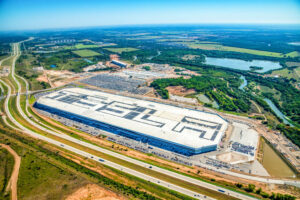Written by Rebecca Turley

In Texas, it’s go big or go home, and that includes its efforts to position itself as a national leader in artificial intelligence. Innovators and trailblazers across the Lone Star State are creating and integrating the AI technologies that are behind seismic shifts in business, industry, and society. And they’re making serious inroads. Beware Silicon Valley, Texas is coming for you.
The Dallas-Fort Worth metro region has become a natural leader in Texas’ AI revolution, no doubt a result of its well-established innovation economy. A superb tech workforce, an exciting startup community, a bevy of research universities and private R&D activities and, of course, its share of Fortune 500 companies (24 and counting), including Google, Amazon, and Microsoft have made the DFW the place to be for AI innovation. CompTIA reported that Texas added the largest number of tech jobs—45,331—to the economy between 2021 and 2022, driven by the DFW region, which was responsible for 14,010 of those jobs.
Major venture capital firms like Sevin Rosen Funds and Trailblazer Capital nurture rising tech startups in the DFW region. Organizations like the Dallas Entrepreneur Center, the Dallas Regional Chamber, and Richardson Innovation Quarter provide support and resources, while the region’s finance, healthcare, energy, and manufacturing sectors provide the ideal environment in which to introduce the newest AI-powered innovations.
As a result, there are plenty of AI companies to talk about here. Like Addison’s Lone Star, which offers prescriptive analytics and guided AI to help companies make more informed business decisions. Their AI-powered technology has infiltrated Texas’ oil and gas industry, with its Evolved AI analysis tool that augments raw pump data to help increase productivity and reduce pump failure.





But DFW is far from the only region in Texas to jump on the AI train. Austin, for example, has become a rising star in AI innovations in recent years, undoubtedly fueled by its long-standing reputation as a big startup tech hub, which earned it the name “Silicon Hills.” Major companies like Dell Technologies, IBM, Google, and Facebook (Meta) all have a presence here, and Apple recently announced the construction of a $1.3 billion campus in Austin, making it the second largest hub outside of Cupertino.
Not surprisingly, this has spurred more than a few AI companies to set up shop in Austin. Just some of the big players in AI in Austin include CognitiveScale, SparkCognition, Mythic AI, and Valkyrie Intelligence.
And Houston’s tech sector is never one to disappoint. Big names like BMC Software, Siemens, Honeywell, Oracle, Hewlett Packard, HighRadius, and NetIQ are among the region’s more than 8,800 tech-related businesses. And startups here are plentiful, with at least two dozen valued at more than $100 million.
Texas has provided the landscape where innovations in artificial intelligence thrive. Now it’s your turn to earn the AI degree that will position you for success in this burgeoning field. Fortunately, a growing number of colleges and universities, both in Texas and across the nation, now offer exciting degree and certificate options in artificial intelligence. Whether you’ve just decided to embark upon a career in artificial intelligence, or you’re a practicing engineer or scientist with plans to focus the next phase of your career on this interdisciplinary field, Texas has what you need to succeed – and then some.
Lost No More: How AI Is Reuniting Air Travelers with Their Valuables
 If you’ve ever left behind a personal item at the airport, either while navigating your way through security, waiting to board your plane, or in those impossibly small pockets in the aircraft, you’ve likely done what most air travelers do: throw your hands up and call it a loss.
If you’ve ever left behind a personal item at the airport, either while navigating your way through security, waiting to board your plane, or in those impossibly small pockets in the aircraft, you’ve likely done what most air travelers do: throw your hands up and call it a loss.
But at the Dallas-Fort Worth International Airport, you may have a very good chance of being reunited with your lost items, thanks to the power of artificial intelligence.
They’ve begun using an AI-powered tool called Lost and Found Software, which is offered through Hallmark Aviation Services. This lost-and-found technology isn’t just good – it’s downright impressive, boasting a 90 percent success rate at returning lost items to their owners.
Here’s how it works: travelers report their missing items, along with specific details. The AI software tool then takes these key details and uses an advanced matching algorithm to compare the missing items with photos and descriptions of found items. Once the match is made, the item is shipped to the owner.
Thanks to the success of the system at DFW International Airport, no less than 11 other airports across the country have begun using the AI-backed lost-and-found system. In any given year, about 18,000 items are reported lost by travelers at DFW International Airport. In 2023 alone, the system successfully reunited about 600 rings, 400 watches, seven Rolexes and even one wedding dress with their owners.
AI Jobs in Texas
According to CompTIA’s 2023 State of the Tech Workforce, Texas’ tech workforce remains the second largest in the nation, delivering an annual economic impact of $159 billion, or— that’s 7.7 percent of the state’s economy. As of 2022, Texas was home to no less than 44,300 tech businesses that employed nearly 868,000 Texans.
Some of the biggest metro areas for tech professionals, including AI scientists and engineers, include Dallas, which reported a net tech employment of 329,347 as of 2022… Houston, which reported a total employment of 150,145… and Austin, which reported a total tech employment of 173,629.
According to the U.S. Department of Labor, jobs among AI scientists and engineers (categorized as computer information and research scientists) are expected to rise by 40 percent in the decade leading up to 2030. During this ten-year period, jobs for AI professionals are projected to increase from 1,230 in 2020 to 1,720 in 2030.
Artificial Intelligence Jobs in Dallas, Fort Worth, Austin, and Houston
From machine learning engineers to software architects to data scientists to computer vision engineers, the artificial intelligence field in Texas is ripe with outstanding opportunities to make your mark.
Dallas/Fort Worth
- AI solutions architects at Southwest Airlines participate in the design and implementation of enterprise AI solutions and provide guidance and support for traditional AI/ML, generative AI, and embedded AI.
- Machine learning research scientists in neurology at UT Southwestern Medical Center are involved in groundbreaking research into dementia. These professionals analyze extensive audio datasets and transcribed text, with the goal of identifying predictive markers of dementia progression.
- AI engineers at Axxess work as part of a diverse solutions delivery team on functional design, process design, prototyping, testing, training, and defining support procedures.
- AI/ML engineers at Veracity Software Inc. develop cutting-edge solutions that leverage Azure, OpenAI, and Copilot technologies. Their expertise lies in building and deploying AI and ML models, form recognition systems, and code generation capabilities.
- Early career AI engineers at Lockheed Martin support corporate-wide Internal Research and Development for the company’s Advance Development Program. These professionals are involved in tactical AI and autonomy initiatives that support the Warfighter and Digital Transformation efforts for AI.
- AI/ML innovation experts at Siemens define and scope AI/ML-based project requirements. They implement data extraction, transformation, loading, and pre-processing pipelines and train and evaluate ML models using classic and deep learning algorithms and techniques.
Houston
- AI/ML programmers at UT Health Houston develop, implement, and support AI/ML solutions to enhance clinical workflows and patient care delivery. These professionals are largely focused on translating academic AI research into practical applications.
- Senior AI Go To Market (GTM) specialists at IBM define, build, and deploy targeted GenAI strategies and governance models to accelerate customer adoption of GenAI services and solutions.
- Data and AI enterprise digital specialists at Microsoft help enterprise customers identify and achieve their business objectives through best-in-class digital engagement and partner co-selling. As part of the Digital Sales Enterprise team, these professionals drive growth for Microsoft by helping customers realize the value of the Microsoft Cloud.
- Senior data and AI engineers (data analytics engineers) at Capgemini design and implement technical solutions. They partner with customers to deliver sustainable, scalable, and profitable business outcomes.
- ML engineers at ExxonMobil in Houston apply statistical analysis, pattern recognition, and ML to solve science, engineering, and commercial problems. These professionals translate business-relevant problems into questions that may be answered using data science, and they design experiments and run simulations to generate new data to support analytic studies.
Austin
- Senior business intelligence/AI managers at Itron lead a team of BI and AI engineers to design, develop, and implement advanced analytics and AI solutions. They collaborate with cross-functional teams to understand business requirements, drive innovation, and ensure the successful delivery of projects.
- ML engineers at Expedia Group collaborate with ML scientists to design and implement a multi-tenant ML system.
- ML engineers at Apple’s Customer Systems Team develop next generation AI and engineering solutions to optimize and enhance the support experience for Apple Care support customers.
How AI Is Transforming Texas’ Advanced Industries
 Texas’ advanced industries provide the optimal environment for the creation and implementation of AI-forward innovations. From Tesla’s Gigafactory in Austin, a ten-million-square-foot manufacturing hub where they’re building a new supercomputer, named Dojo to help run the AI software behind the company’s self-driving vehicles, to Samsung, which recently announced an expansion of its Taylor plant due to a rising number of AI chip manufacturing deals, Texas is rich in opportunities to become part of the AI revolution.
Texas’ advanced industries provide the optimal environment for the creation and implementation of AI-forward innovations. From Tesla’s Gigafactory in Austin, a ten-million-square-foot manufacturing hub where they’re building a new supercomputer, named Dojo to help run the AI software behind the company’s self-driving vehicles, to Samsung, which recently announced an expansion of its Taylor plant due to a rising number of AI chip manufacturing deals, Texas is rich in opportunities to become part of the AI revolution.
Aerospace, Aviation, and Defense
Exciting opportunities abound in Texas’ aerospace, aviation, and defense industries. The Lone Star State is home to two international airlines, 15 active military bases, NASA’s Johnson Space Center, and major global players like Lockheed Martin, Southwest Airlines, SpaceX, Boeing, Blue Origin, Raytheon, and American Airlines. All of them have already begun exploring the power of AI to transform everything from commercial space tourism to national defense.
Biotechnology and Life Sciences
The biotechnology and life sciences sectors also have a large presence in Texas. Major life science and research firms; top-tier research universities; some of the nation’s top medical schools; and renowned healthcare centers, including the world’s largest medical center (Texas Medical Center) and the world’s largest cancer hospital (MD Anderson Center), have made Texas a nucleus for groundbreaking medical research and commercial development. Biotech companies in Texas like McKesson, Medtronic, Novartis, and Abbott are using AI to expand their groundbreaking developments in medicine and healthcare.
Energy
For more than 120 years, Texas has remained a leader in energy production. Today, it’s the top producer of crude oil and natural gas. But it’s also become a force in renewable energy, with major resources in wind, solar, and biomass. Major energy companies in Texas exploring the power of AI include Exxon Mobil, Phillips 66, Halliburton, ConocoPhillips, and Occidental Petroleum.
AI Companies in Dallas/Fort Worth, Austin, and Houston
From emerging startups to established leaders, Texas is rich in opportunities to make a difference in the field of artificial intelligence.
The Dallas/Fort Worth region has built an exceptional R&D network that includes major players like the AI Laboratory at Southern Methodist University and the Center for Applied AI & Machine Learning at the University of Texas at Dallas, which was designated a national research university by the State of Texas in 2018.
Tech support and startup resources are also plentiful. For example, the nonprofit Dallas AI Meetup Group boasts some 5,000 members who gather to share their knowledge and collaborate with one another, while the growing incubator hub, AI Center Dallas, is solely devoted to building and supporting tech companies focused on artificial intelligence.
In Austin, AI companies are making headlines at a rapid pace. Take Jasper AI, for example. This content-creating AI company raised $125 million in Series A funding with a $1.5 billion evaluation as of 2022, making it Austin’s newest unicorn and one of the fastest companies to achieve unicorn status.
And Eagle Eye Network, which boasts an AI-powered cloud video surveillance platform, secured more than $100 million in funding – one of the largest funding rounds of any company in Central Texas in 2023. This company boasts about 200 employees in Austin and another 300 throughout Asia, Europe, and the Middle East.
Austin was also the only city in Texas to make it on Forbes’ 2023 list of the promising privately held companies building businesses out of AI. Two Austin companies made the list: Jasper AI and Slingshot Aerospace.
Houston also has its share of rising AI stars like Bluware, which leverages cloud and AI innovations to revolutionize how geoscientists gather and interpret data and workflows. Houston is also home to FlightAware, a digital aviation company that operates the world’s latest flight tracking and data platform using neural network-powered predictive models.
AI Salary in Austin, DFW, Houston, and San Antonio
According to the Bureau of Labor Statistics (BLS), Texas’ AI scientists and engineers, who are categorized by the BLS as computer and information research scientists, earned a median salary of $136,060 as of May 2022. Those newest to the profession earned about $99,210, while those at the top of the pay scale earned about $220,640 during this time.
The Dallas-Fort Worth metro area reported the highest median salary among Texas’ largest metro areas, at $140,850, followed closely by the Houston metro area (includes The Woodlands and Sugar Land), at $138,650.
The Austin metro area, however, came out as a winner for its top pay of AI scientists and engineers as of May 2022, at $224,980, followed by Houston, at $220,640, and DFW, at $212,610.
The San Antonio metro area reported a median salary of just $123,930, which was about $10,000 below the state median. Similarly, the average top salary here was $182,860, which was about $38,000 below the state’s average top salary.
Artificial Intelligence and Machine Learning Master’s Degree and Certificate Courses in Texas and Online
Degree and certificate programs in artificial intelligence, both in Texas and throughout the country, are preparing tomorrow’s engineers, scientists, analysts, business professionals, and more to deftly navigate the complexities, challenges, and opportunities of this disruptive technology.
Bachelor’s degrees in AI provide a solid introduction to the field through a blend of theory and practical applications. These math-based programs usually feature a core that includes courses like linear algebra, calculus, and statistics, alongside an exploration of AI subfields like data analytics, cloud computing, and machine learning.
Graduate degrees and certificate programs in AI are expertly designed for career changers and currently practicing scientists and engineers. These programs are usually structured as computer science or engineering degrees, with elective courses that allow students to specialize in a specific area of AI, such as robotics, cybersecurity, and machine learning. The University of Houston Downtown offers an MS in Artificial Intelligence that includes coursework in data mining, deep learning, and computer vision, as well as elective options like AI in biomedical, AI in business intelligence, and robotics process automation.
Many programs offer a host of specialization/concentration options to allow students to create a personalized course of study that best reflects their career plans. For example, the University of North Texas offers an MS in AI with concentration options in machine learning, biomedical engineering, or autonomous systems. They also offer a broader MS in Machine Learning and AI program, as well as a Graduate Certificate in Big Data and Intelligent Systems.
Machine Learning Degree and Certificate Options in Denton
Machine learning degrees and certificate programs provide a solid foundation in the mathematical foundations, algorithms, tools, and applications associated with AI and ML. These programs explore the technologies, tools, and platforms used to study real data sets and perform data analysis tasks.
AI Computer Science Degree and Certificate Options in Houston
AI computer science degrees and certificate programs are grounded in programming, algorithms, data structures, and computer systems. These programs allow students to understand and develop AI algorithms and systems.
University of Houston Downtown (Public)
College of Sciences and Technology
Houston, TX
Website

MS in Artificial Intelligence (on-campus)
Also offers:
- BS in Computer Science-AI and Data Analytics cluster
- Minor in AI
Total Estimated Program Cost: $12,420 ($780 per-credit out-of-state)
University of North Texas
College of Engineering
Denton, TX
Website

MS in Machine Learning and AI (on-campus)
MS in AI (on-campus)
Offered with concentration options in:
- Machine Learning
- Biomedical Engineering
- Autonomous Systems
Total Estimated Program Cost: $11,649 ($773 per-credit out-of-state)
Total tuition comes in at $386 below the state average for similar programs.
Graduate Academic Certificate in Big Data and Intelligent Systems (online)
Also offers:
- Undergraduate Certificate in AI
- Option to combine a BS in Computer Science with an MS in AI
- Option to combine a BS in Information Technology with an MS in AI
- PhD in Computer Science and Engineering with a focus on Intelligent Systems
Total Estimated Program Cost: $4,236 ($570 per-credit out-of-state)
2022 US Bureau of Labor Statistics salary figures for computer information and research scientists. Job growth projections from the US Department of Labor-sponsored resource, CareerOneStop. Figures are based on state data, not school-specific information. Conditions in your area may vary. Data accessed March 2024.






